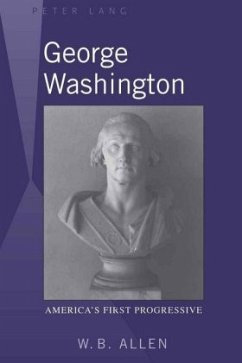George Washington defined progressivism and provided the rationale for its constitutional basis in a vision of self-government: a nation dedicated to and capable of sustaining civil and religious liberty, the intertwined ends of politics as he saw it. For Washington, religious liberty was not a side benefit of independence but rather the objective for which independence was sought.
Washington's political philosophy - radical for his time - was a commitment to the belief that law can never make just what is in its nature unjust. Before the close of the Revolutionary War, he had conceived of a union based on the progressive principle that the American people would qualify for self-government in the sense of free institutions in proportion to their moral capacity to govern themselves by the light of reason. Washington managed the conflicts over the spoils of victory that threatened to fracture the union. Containing this discord "within the walls of the Constitution" may be considered his single greatest achievement.
This overview traces Washington's political development through the war years, describes his contributions to the Constitution and the founding of America, debunks misrepresentations of Washington's relationship to slavery, and touches his presidential administration, including his precedent-setting decision to retire from the presidency after two terms. This book will be useful in courses on the American founding era, American studies, political philosophy and leadership, as well as of interest and value to the general reader.
Washington's political philosophy - radical for his time - was a commitment to the belief that law can never make just what is in its nature unjust. Before the close of the Revolutionary War, he had conceived of a union based on the progressive principle that the American people would qualify for self-government in the sense of free institutions in proportion to their moral capacity to govern themselves by the light of reason. Washington managed the conflicts over the spoils of victory that threatened to fracture the union. Containing this discord "within the walls of the Constitution" may be considered his single greatest achievement.
This overview traces Washington's political development through the war years, describes his contributions to the Constitution and the founding of America, debunks misrepresentations of Washington's relationship to slavery, and touches his presidential administration, including his precedent-setting decision to retire from the presidency after two terms. This book will be useful in courses on the American founding era, American studies, political philosophy and leadership, as well as of interest and value to the general reader.
"This fascinating study captures the essence of republican constitutional order and of George Washington's crucial role in its founding. It is at once brilliant and profound." (Forrest McDonald, University of Alabama; Author of 'States Rights and the Union' and 'Novus ordo seclorum: The Intellectual Origins of the Constitution')
"W. B. Allen makes a point so simple, it seems revolutionary: George Washington knew what he was doing; he said so many times in his career; and if we listen and think, we can hear it today." (Richard Brookhiser, Senior Editor, 'National Review'; Author of 'What Would the Founders Do? Our Questions, Their Answers', and others)
"W. B. Allen makes a point so simple, it seems revolutionary: George Washington knew what he was doing; he said so many times in his career; and if we listen and think, we can hear it today." (Richard Brookhiser, Senior Editor, 'National Review'; Author of 'What Would the Founders Do? Our Questions, Their Answers', and others)

